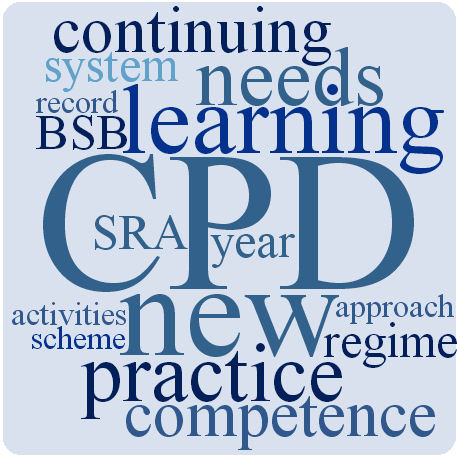
The era of traditional CPD “points” requirements for both solicitors and barristers is drawing to a close, with new continuing practice development regimes being introduced for the next practice year. Whilst there has been plenty of notice of this (for solicitors, not so much for barristers), it’s understandable that many practitioners, particularly those operating without centralised training support, are uncertain what lies ahead and how this differs from what they have known.
The purpose of this article is to clarify the position as it pertains now (in the 2016 practice year) and to summarise the new requirements that will be operative in the next.
Solicitors
In April 2015 the Solicitors Regulation Authority introduced a new “continuing competence” regime to replace traditional CPD. This could be adopted on a voluntary basis until 31 October 2016. As from 1 November 2016 it becomes mandatory.
For the practice year 2015/16 you can therefore continue, as previously, to complete 16 hours CPD or you can choose to follow the new continuing competence regime. That is, until 31 October 2016, you can continue to record time spent on “CPD activities” (as per reg 8 of the Handbook).
There is no longer a requirement to obtain 25 per cent face to face, so, for example, you can obtain all of your 16 hours CPD by doing online (or “distance learning”) courses.
Also from April 2015 the SRA discontinued the system of accreditation of CPD providers, a point which seems to have been conveniently ignored by a number of formerly-accredited providers who still sell their accreditation credentials. You can undertake relevant CPD activities provided by any reputable training provider.
The SRA’s new approach to continuing competence, which is optional now, mandatory from 1 November 2016, does away with the requirement to obtain a fixed number of hours CPD and puts the onus on the individual solicitor to assess their own needs and plan their own training. As summarised by the SRA, the system requires you to:
- reflect on your practice to identify your learning and development needs;
- plan how you will address your learning and development needs;
- think about how you can address your learning and development needs; and
- record and evaluate your learning and development activity.
The SRA provides a very clear set of explanatory pages and you should, at the least, take an hour out to review this “toolkit”.
Barristers
For 2016 barristers should continue to obtain 12 hours CPD as before from providers who are currently accredited by the Bar Standards Board.
For 2017 the BSB will be implementing a new approach to CPD. The new regime will:
- emphasise your individual responsibility for identifying your own training and development needs;
- remove the requirement that you need to carry out a certain number of CPD hours; and
- emphasise your individual responsibility for achieving specific learning outcomes, rather than simply measuring the effort involved.
A public consultation on the regulations for the new scheme concluded on 1 September 2016. Details of the final scheme will be published by the BSB in late 2016 and the system will be effective from 1 January 2017.
The nub of it
Whilst there is much difference in the detailed descriptions of the two schemes, the intentions behind them are identical: to place the onus on the individual for determining their own learning and development needs, for planning and executing a program, and for recording the outcome. For many, CPD had become an annual tick-box exercise: to buy accredited courses worth the requisite hours which were sometimes of questionable appropriateness and often only half-heartedly completed. That will no longer cut the mustard.
What’s in a name?
The SRA has opted for new terminology; their scheme is for “continuing competence” and no mention is made of CPD except in historical context. Contrarily, the BSB’s scheme continues to be called “CPD” and I suspect that will live on as shorthand for solicitors too.
Onerous?
Some contend that the new regimes will be onerous on practitioners. In a response to the BSB’s consultation paper on the new rules, the Bar Council has criticised the planned CPD regime as being “complicated”, requiring burdensome self-assessment and imposing “unnecessary formalities”.
It’s true that both regulators go into a fair level of detail explaining the new regimes; but the core requirements are no less I think than one would expect of any competent professional. At least once a year, think about how you do your job, what you need in order to do it better and who can help; write that down; do it; then write up the outcome. Is that asking too much?
Nick Holmes is Editor of the Newsletter and MD of infolaw. Email nickholmes@infolaw.co.uk. Twitter @nickholmes.
Our Internet for Lawyers CPD competence courses are online now at www.infolaw.co.uk/cpd/.
One thought on “Changes to CPD”
Comments are closed.